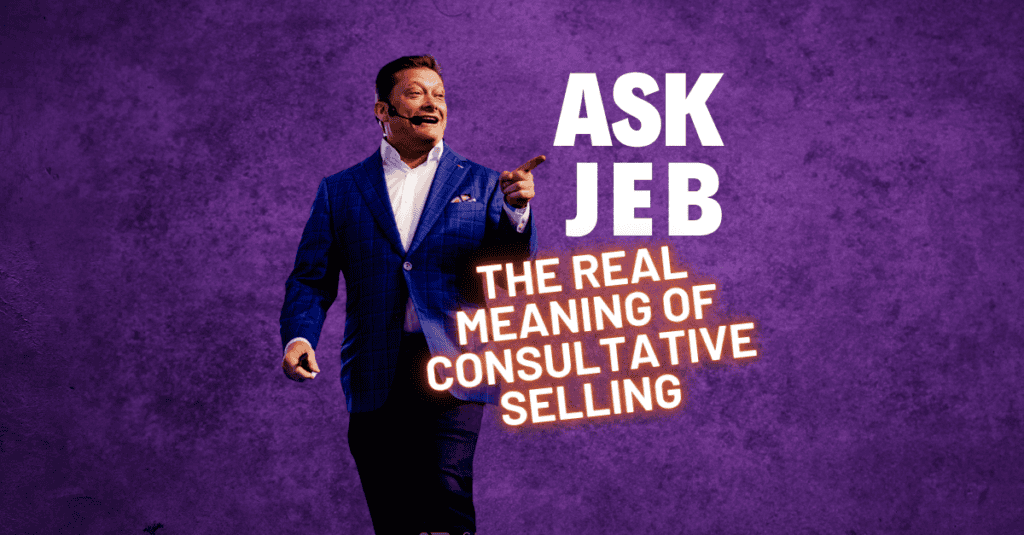Podcast: Play in new window | Embed
Subscribe: Apple Podcasts | Spotify | Amazon Music | Pandora | iHeartRadio | Email | RSS
Steve from Portland, Oregon, faces and an all-too-common consultative selling dilemma: how to sell to prospects who claim they already know everything, have already “done the research” and question what value he can bring. In this Ask Jeb episode we break down what true consultative selling entails, how to detach from “always be closing,” and why being a genuine expert is more vital now than ever.
From Information Scarcity to Information Overload
Not long ago, salespeople had the upper hand simply by having more data or insight than their prospects. Today, everyone has a blog, video, or TikTok to help them “figure it out.” This can leave a buyer believing, “I know just as much as you—so why should I trust your approach?” That’s where consultative selling comes in, but only if you do it right.
Consultative selling isn’t about showing off your expertise. It’s about guiding the customer to understand the real nature of their problem—often one they didn’t fully realize or that’s more complex than they initially thought.
What True Consultative Selling Looks Like
Consultants by definition don’t barge in declaring, “Here’s the solution.” They start by asking informed, open-ended questions and listening for patterns. They bring a sense of curiosity—an acknowledgment that they can’t help until they deeply understand the client’s unique environment.
Four Steps of a Consultative Approach
- Assess and Analyze: Listen, observe, and probe with specific questions. Gain clarity on how the business operates and where potential issues lie.
- Design or Develop Solutions: Tailor ideas or strategies based on the actual problems your client is facing. No cookie-cutter templates here.
- Integrate and Implement:Work with the client to fold your solution into their workflows. Show them the path forward, not just a list of theoretical bullet points.
- Optimize and Operationalize: Stay engaged. Help the client refine and sustain the changes for long-term success.
The Power of Detaching from the Outcome
When you’re obsessed with “the close,” you risk pushing your own agenda rather than uncovering the client’s real challenges. Buyers can smell desperation a mile away. Detachment works with consultative selling because:
- It builds trust. You’re not rushing to pitch; you’re learning and diagnosing first.
- It reveals the real issues. Prospects open up more when they sense you’re genuinely trying to see if you can help, not just bulldoze them into a sale.
- It prevents the “sleazy” vibe. Instead of coming off like yet another sales rep bragging about your knowledge, you show you’re a collaborator ready to craft a solution if—and only if—it fits.
Being the Expert Without Acting Like a Know-It-All
In today’s age of surplus information, it isn’t enough just to learn a skill once. You have to remain curious and update your knowledge constantly. That’s especially true in fields like digital marketing, sales tech, or AI—areas that can evolve daily. You’ll be more credible when you
- Commit to ongoing learning. Read, watch, and listen to everything you can, including contrary opinions.
- Embrace nuance. Real expertise means recognizing that not every trend or hack will work for every client.
- Use informed questions. The best proof of your knowledge is the quality of the questions you ask. Clients can tell when your questions hit the root of their problem.
Addressing Distrust in Competitive Industries
In spaces like digital marketing, where so many agencies promise miracles, skepticism runs high. By entering a conversation with a consultative mindset, you set yourself apart from the noise:
- Focus on your prospect’s specific context. Don’t lump them into one-size-fits-all solutions.
- Acknowledge the client’s prior experiences. They may have been burned by poor service or overhyped promises. Show empathy for their concerns.
- Offer to walk away if it’s not the right fit. This willingness to say “no” boosts your authenticity tenfold.
When They Already “Know It All”
If a buyer has read every blog post or watched every video, your role isn’t to arm-wrestle over knowledge. Instead, demonstrate the value of personalized guidance that no quick Google search can replicate.
AI-driven search might be the buzz, but how does that apply to a real, live company’s marketing funnel? That’s where your on-the-ground insight matters. If you’ve tracked trends across dozens of client accounts, you can spot patterns or pitfalls a do-it-yourselfer misses.
The Full Pipeline Advantage
None of this is easy if your pipeline is empty. Desperation kills consultative selling because you can’t afford to walk away from a deal that isn’t a good match. That’s all the more reason to stay on top of your prospecting game—so you can approach each interaction with calm, genuine curiosity.
Key Takeaways
- Stop trying to prove you’re the expert. Prove you’re the right person to uncover their unique issues.
- Detach from the outcome. Your job is to see if you can help, not to force a close at any cost.
- Ask better questions. Use your ongoing research and pattern recognition to frame questions that reveal real pain points.
- Stay curious. The information age isn’t slowing down, so never settle for “I’m already up to speed.”
- Aim for trust, not just data. Even if a prospect has all the facts, they still need someone to interpret and guide them effectively.
Consultative selling in an information-saturated world requires humility, expertise, and the courage to say, “Maybe this isn’t right for you.” Yet when it does match, the value you provide extends far beyond what any self-guided research can deliver. If you’re ready to transform how you engage clients, let consultative selling lead the way—stepping in with curiosity, listening intently, and building solutions that align with real problems.
Got a question or challenge for me? Head over to salesgravy.com/ask to share what’s on your mind. We might feature your question next and help you refine your approach to sales—consultative or otherwise.






